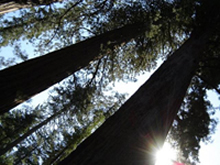USA: Reduced summer fog may put redwoods in danger
17.02.10
A new study has shown that declining summer fog along the Pacific coast may be affecting the mighty coast redwoods and other important ecosystems.
 The findings reported yesterday in the Proceedings of the National Academy of Sciences infer an approximate 33% reduction in fog frequency since the early 20th century. Californian summers are famously long, hot and dry and the cooling fog plays an important role in protecting the redwoods from water loss in these months. The fog also plays an important role in driving the climate of the Pacific coast.
The findings reported yesterday in the Proceedings of the National Academy of Sciences infer an approximate 33% reduction in fog frequency since the early 20th century. Californian summers are famously long, hot and dry and the cooling fog plays an important role in protecting the redwoods from water loss in these months. The fog also plays an important role in driving the climate of the Pacific coast.
The researchers say the redwoods are concentrated in coastal areas because they are not as well adapted as other Californian tree species to drought. A reduction in the fog may, therefore, have a significant effect on the trees and other ecological relationships.
By comparing climatic data with analysis of tree rings it was discovered that reduced fog was possibly affecting the growth of the trees. However, one of the authors, Dr James Johnstone told the BBC that "we need further analysis to find out whether the effects are as we expect."
Full article on the Proceedings of the National Academy site.
Coast redwood (Sequoia sempervirens) are some of the tallest trees on earth reaching
heights of nearly 120m. They are native to coastal California and southwest Oregon.
© Charlie Webster
Related links:
15.12.09
 Many plant species around the world are threatened by a changing climate. But, topping the list, according to IUCN, is the Quiver Tree (Aloe dichotoma) of southern Africa.
Many plant species around the world are threatened by a changing climate. But, topping the list, according to IUCN, is the Quiver Tree (Aloe dichotoma) of southern Africa.